University Module Reflection: Developing Skills for Employability
VerifiedAdded on 2022/10/12
|12
|1934
|24
Report
AI Summary
This report provides a reflective analysis of a student's experience with a Continuing Professional Development (CPD) module and its impact on skill development. The student utilizes the Gibbs reflective cycle to evaluate their learning journey, focusing on how the module enhanced their employability. The report details the application of the Gibbs cycle across various skill areas, including communication, research, ICT proficiency, teamwork, time management, and problem-solving. It highlights the student's self-assessment, identification of weaknesses, and strategies for improvement in each skill area. The conclusion emphasizes the effectiveness of the Gibbs cycle in fostering skill development and enhancing career prospects, encouraging continued use of the reflective process for future professional growth. The report references several sources to support its findings, demonstrating a comprehensive understanding of the subject matter.
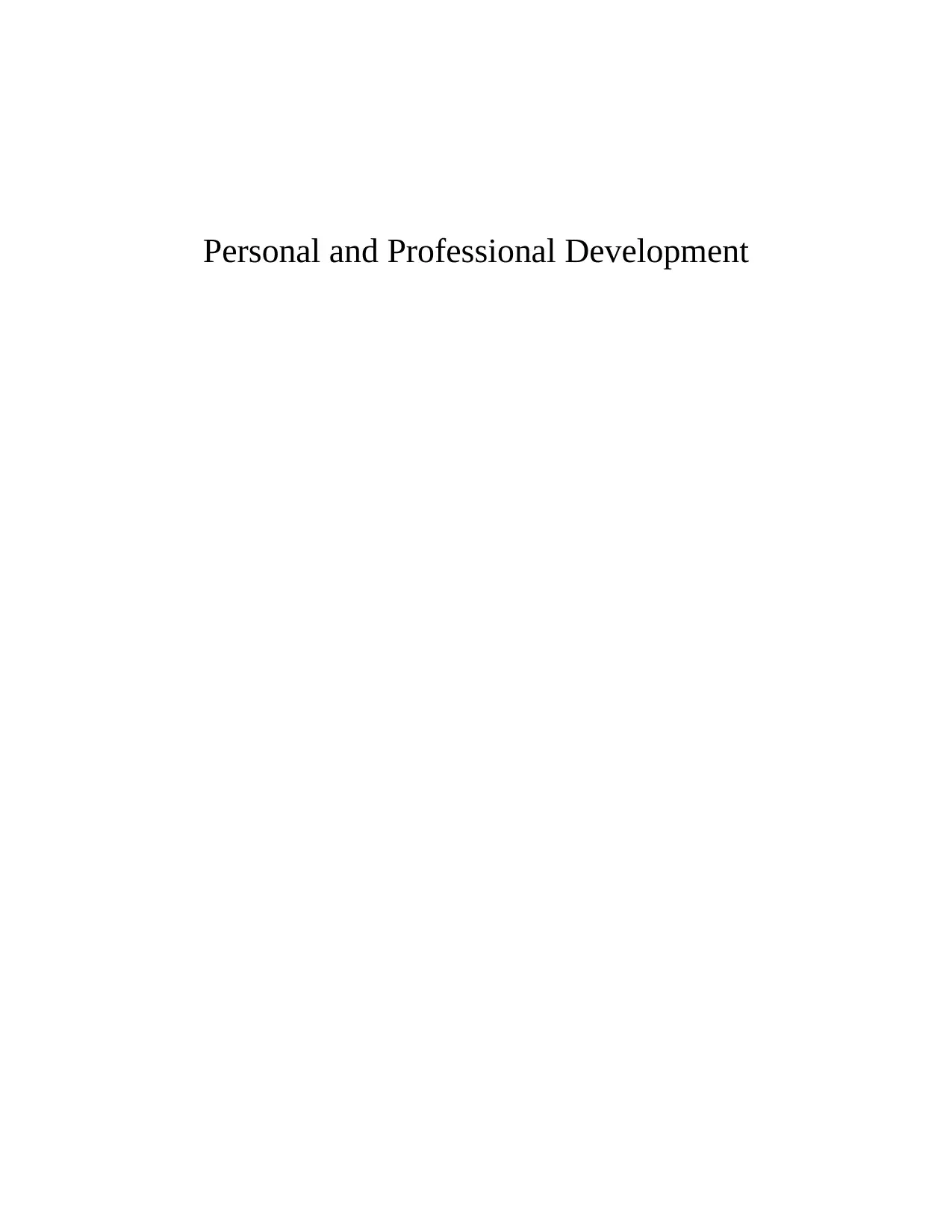
Personal and Professional Development
Paraphrase This Document
Need a fresh take? Get an instant paraphrase of this document with our AI Paraphraser
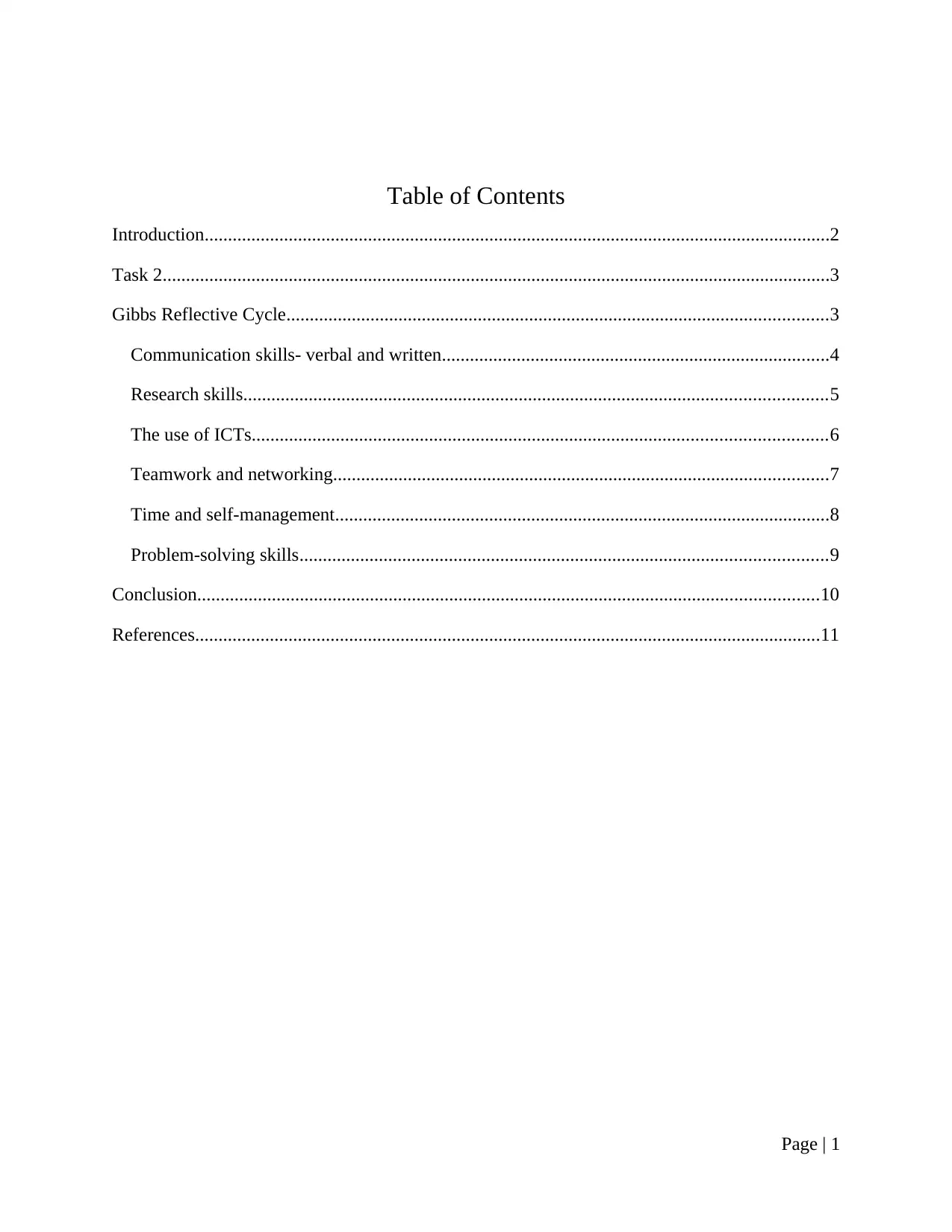
Table of Contents
Introduction......................................................................................................................................2
Task 2...............................................................................................................................................3
Gibbs Reflective Cycle....................................................................................................................3
Communication skills- verbal and written...................................................................................4
Research skills.............................................................................................................................5
The use of ICTs...........................................................................................................................6
Teamwork and networking..........................................................................................................7
Time and self-management..........................................................................................................8
Problem-solving skills.................................................................................................................9
Conclusion.....................................................................................................................................10
References......................................................................................................................................11
Page | 1
Introduction......................................................................................................................................2
Task 2...............................................................................................................................................3
Gibbs Reflective Cycle....................................................................................................................3
Communication skills- verbal and written...................................................................................4
Research skills.............................................................................................................................5
The use of ICTs...........................................................................................................................6
Teamwork and networking..........................................................................................................7
Time and self-management..........................................................................................................8
Problem-solving skills.................................................................................................................9
Conclusion.....................................................................................................................................10
References......................................................................................................................................11
Page | 1
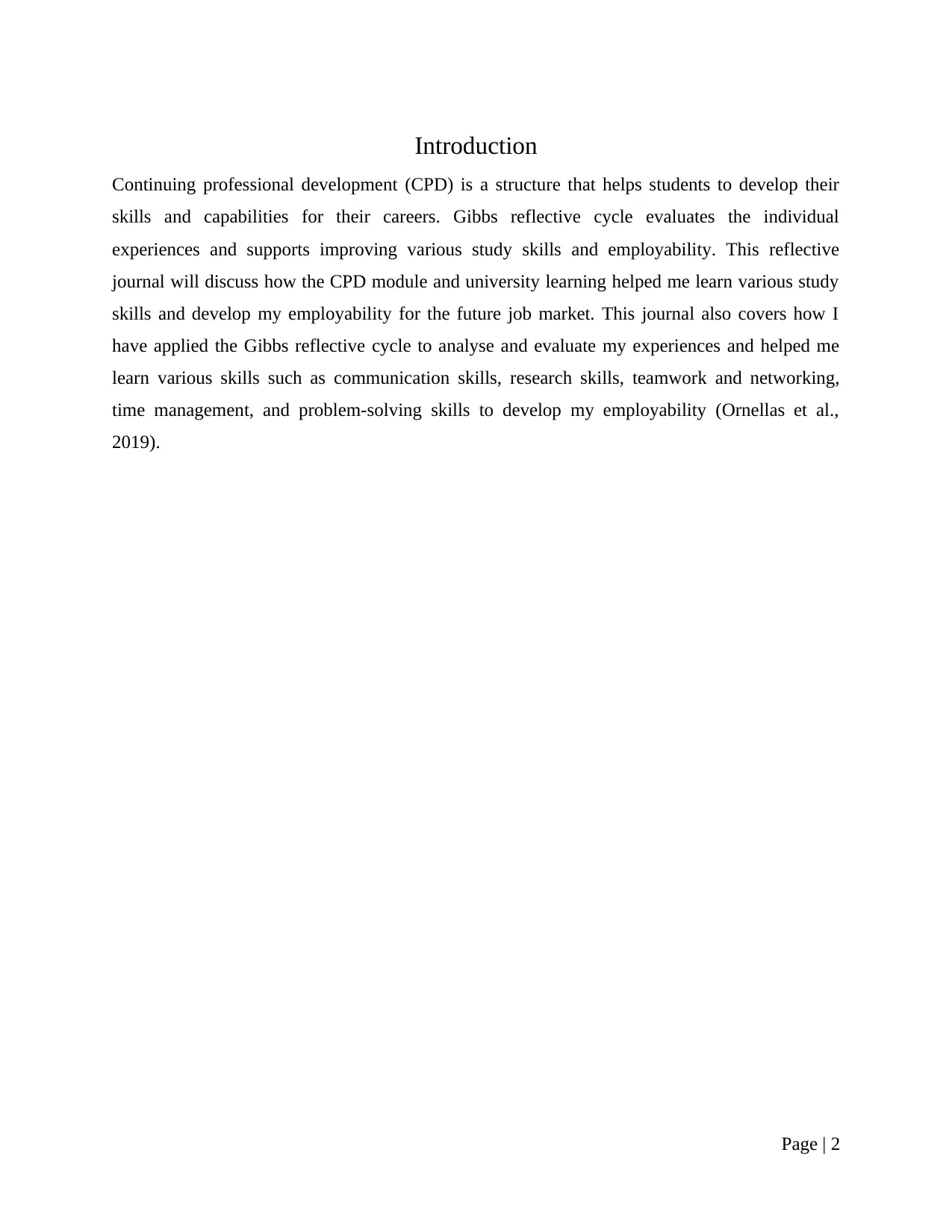
Introduction
Continuing professional development (CPD) is a structure that helps students to develop their
skills and capabilities for their careers. Gibbs reflective cycle evaluates the individual
experiences and supports improving various study skills and employability. This reflective
journal will discuss how the CPD module and university learning helped me learn various study
skills and develop my employability for the future job market. This journal also covers how I
have applied the Gibbs reflective cycle to analyse and evaluate my experiences and helped me
learn various skills such as communication skills, research skills, teamwork and networking,
time management, and problem-solving skills to develop my employability (Ornellas et al.,
2019).
Page | 2
Continuing professional development (CPD) is a structure that helps students to develop their
skills and capabilities for their careers. Gibbs reflective cycle evaluates the individual
experiences and supports improving various study skills and employability. This reflective
journal will discuss how the CPD module and university learning helped me learn various study
skills and develop my employability for the future job market. This journal also covers how I
have applied the Gibbs reflective cycle to analyse and evaluate my experiences and helped me
learn various skills such as communication skills, research skills, teamwork and networking,
time management, and problem-solving skills to develop my employability (Ornellas et al.,
2019).
Page | 2
⊘ This is a preview!⊘
Do you want full access?
Subscribe today to unlock all pages.

Trusted by 1+ million students worldwide
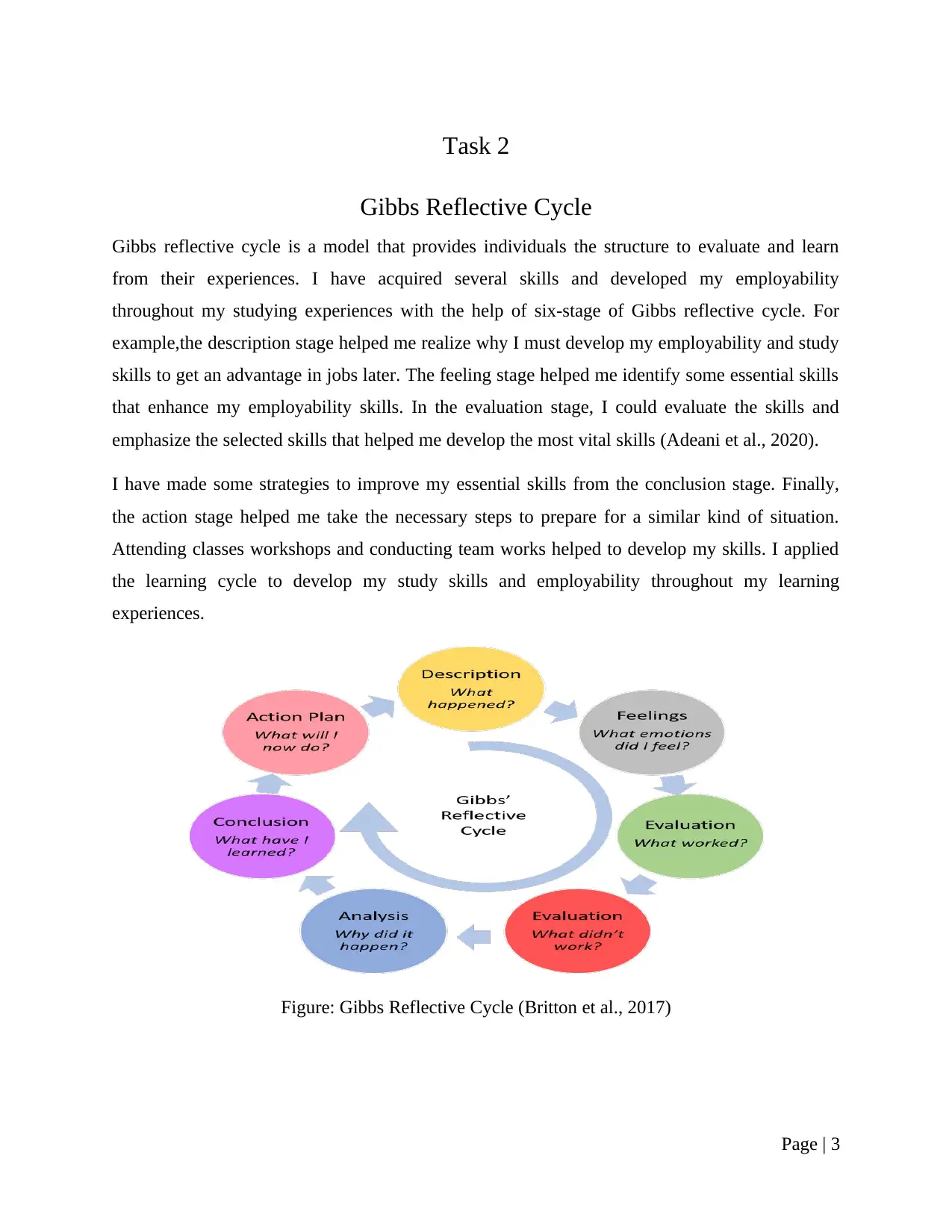
Task 2
Gibbs Reflective Cycle
Gibbs reflective cycle is a model that provides individuals the structure to evaluate and learn
from their experiences. I have acquired several skills and developed my employability
throughout my studying experiences with the help of six-stage of Gibbs reflective cycle. For
example,the description stage helped me realize why I must develop my employability and study
skills to get an advantage in jobs later. The feeling stage helped me identify some essential skills
that enhance my employability skills. In the evaluation stage, I could evaluate the skills and
emphasize the selected skills that helped me develop the most vital skills (Adeani et al., 2020).
I have made some strategies to improve my essential skills from the conclusion stage. Finally,
the action stage helped me take the necessary steps to prepare for a similar kind of situation.
Attending classes workshops and conducting team works helped to develop my skills. I applied
the learning cycle to develop my study skills and employability throughout my learning
experiences.
Figure: Gibbs Reflective Cycle (Britton et al., 2017)
Page | 3
Gibbs Reflective Cycle
Gibbs reflective cycle is a model that provides individuals the structure to evaluate and learn
from their experiences. I have acquired several skills and developed my employability
throughout my studying experiences with the help of six-stage of Gibbs reflective cycle. For
example,the description stage helped me realize why I must develop my employability and study
skills to get an advantage in jobs later. The feeling stage helped me identify some essential skills
that enhance my employability skills. In the evaluation stage, I could evaluate the skills and
emphasize the selected skills that helped me develop the most vital skills (Adeani et al., 2020).
I have made some strategies to improve my essential skills from the conclusion stage. Finally,
the action stage helped me take the necessary steps to prepare for a similar kind of situation.
Attending classes workshops and conducting team works helped to develop my skills. I applied
the learning cycle to develop my study skills and employability throughout my learning
experiences.
Figure: Gibbs Reflective Cycle (Britton et al., 2017)
Page | 3
Paraphrase This Document
Need a fresh take? Get an instant paraphrase of this document with our AI Paraphraser
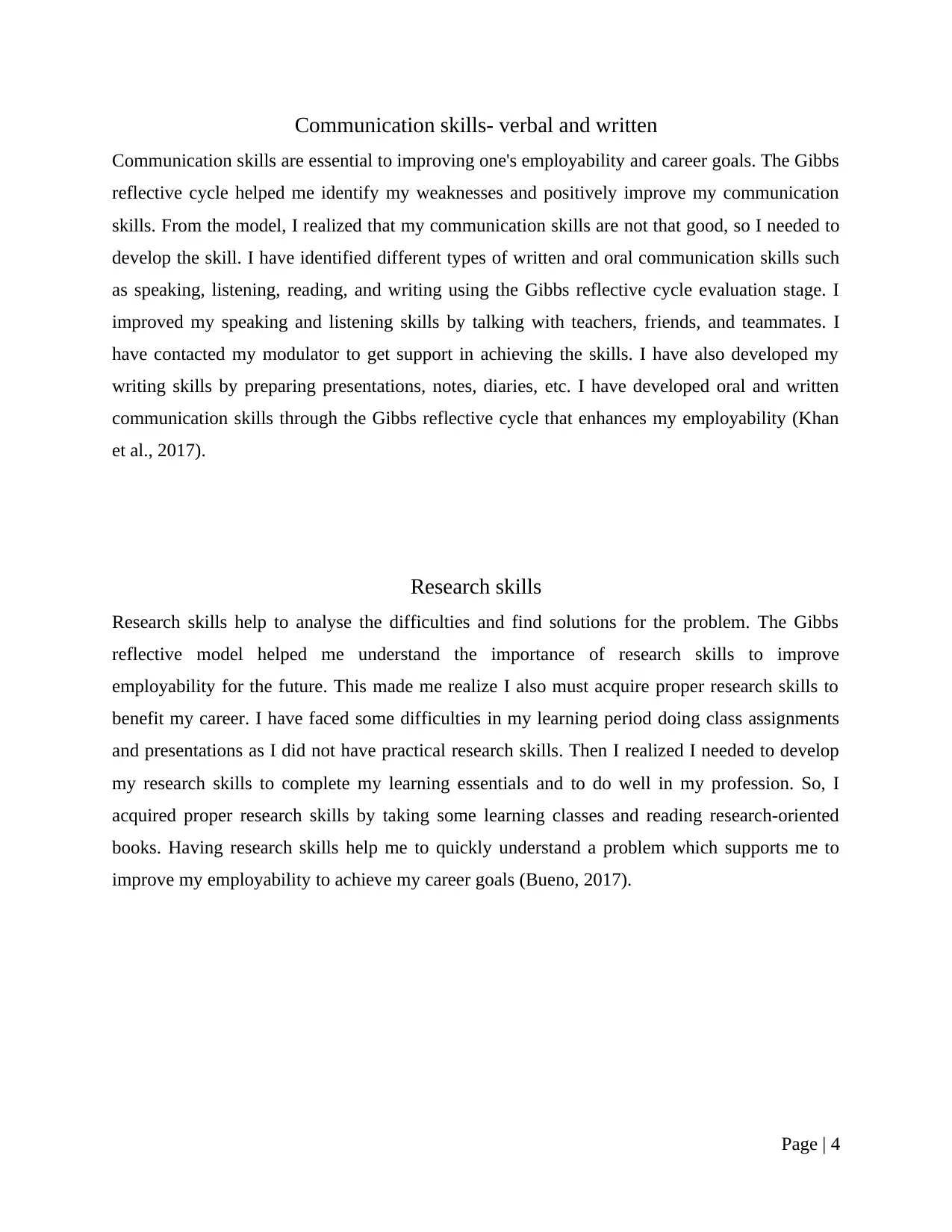
Communication skills- verbal and written
Communication skills are essential to improving one's employability and career goals. The Gibbs
reflective cycle helped me identify my weaknesses and positively improve my communication
skills. From the model, I realized that my communication skills are not that good, so I needed to
develop the skill. I have identified different types of written and oral communication skills such
as speaking, listening, reading, and writing using the Gibbs reflective cycle evaluation stage. I
improved my speaking and listening skills by talking with teachers, friends, and teammates. I
have contacted my modulator to get support in achieving the skills. I have also developed my
writing skills by preparing presentations, notes, diaries, etc. I have developed oral and written
communication skills through the Gibbs reflective cycle that enhances my employability (Khan
et al., 2017).
Research skills
Research skills help to analyse the difficulties and find solutions for the problem. The Gibbs
reflective model helped me understand the importance of research skills to improve
employability for the future. This made me realize I also must acquire proper research skills to
benefit my career. I have faced some difficulties in my learning period doing class assignments
and presentations as I did not have practical research skills. Then I realized I needed to develop
my research skills to complete my learning essentials and to do well in my profession. So, I
acquired proper research skills by taking some learning classes and reading research-oriented
books. Having research skills help me to quickly understand a problem which supports me to
improve my employability to achieve my career goals (Bueno, 2017).
Page | 4
Communication skills are essential to improving one's employability and career goals. The Gibbs
reflective cycle helped me identify my weaknesses and positively improve my communication
skills. From the model, I realized that my communication skills are not that good, so I needed to
develop the skill. I have identified different types of written and oral communication skills such
as speaking, listening, reading, and writing using the Gibbs reflective cycle evaluation stage. I
improved my speaking and listening skills by talking with teachers, friends, and teammates. I
have contacted my modulator to get support in achieving the skills. I have also developed my
writing skills by preparing presentations, notes, diaries, etc. I have developed oral and written
communication skills through the Gibbs reflective cycle that enhances my employability (Khan
et al., 2017).
Research skills
Research skills help to analyse the difficulties and find solutions for the problem. The Gibbs
reflective model helped me understand the importance of research skills to improve
employability for the future. This made me realize I also must acquire proper research skills to
benefit my career. I have faced some difficulties in my learning period doing class assignments
and presentations as I did not have practical research skills. Then I realized I needed to develop
my research skills to complete my learning essentials and to do well in my profession. So, I
acquired proper research skills by taking some learning classes and reading research-oriented
books. Having research skills help me to quickly understand a problem which supports me to
improve my employability to achieve my career goals (Bueno, 2017).
Page | 4
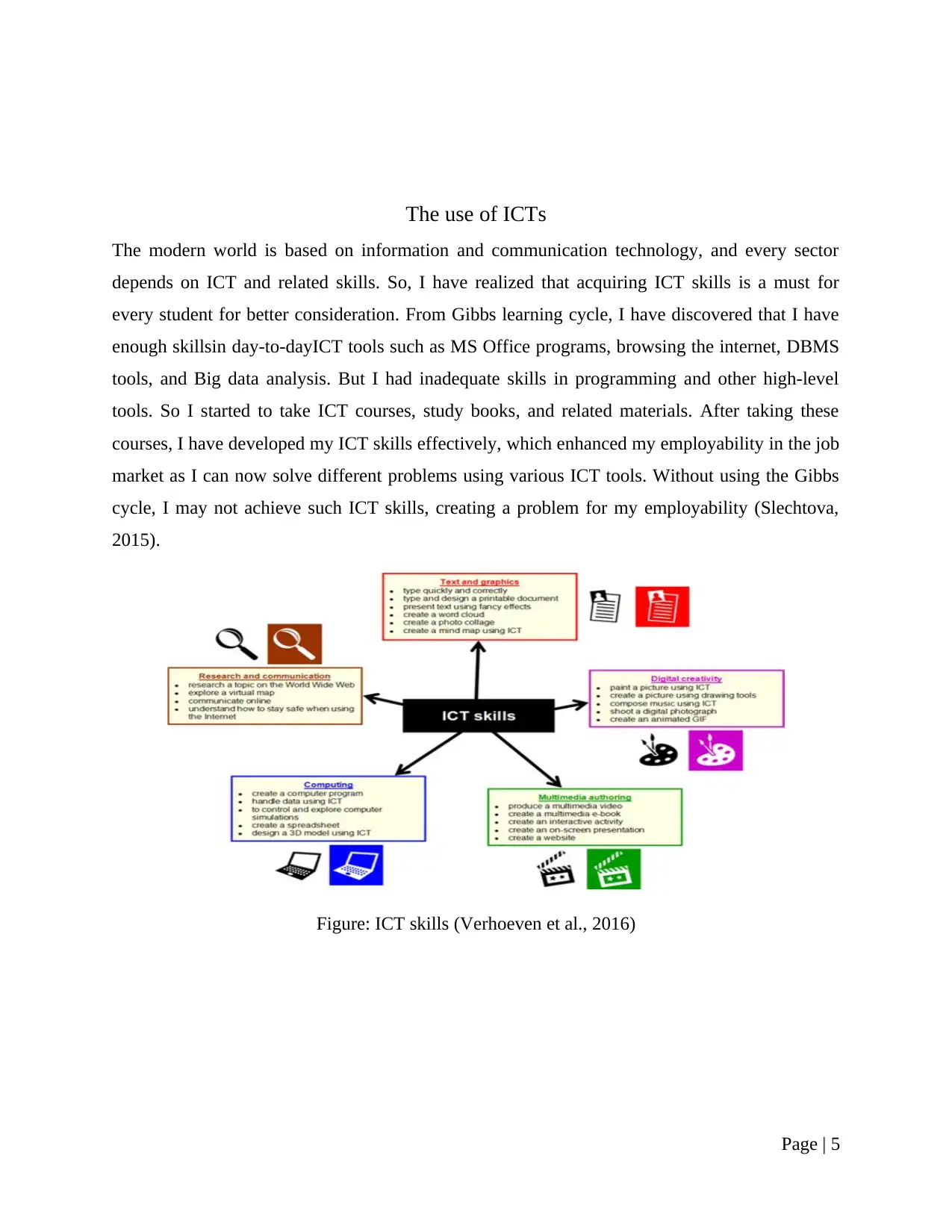
The use of ICTs
The modern world is based on information and communication technology, and every sector
depends on ICT and related skills. So, I have realized that acquiring ICT skills is a must for
every student for better consideration. From Gibbs learning cycle, I have discovered that I have
enough skillsin day-to-dayICT tools such as MS Office programs, browsing the internet, DBMS
tools, and Big data analysis. But I had inadequate skills in programming and other high-level
tools. So I started to take ICT courses, study books, and related materials. After taking these
courses, I have developed my ICT skills effectively, which enhanced my employability in the job
market as I can now solve different problems using various ICT tools. Without using the Gibbs
cycle, I may not achieve such ICT skills, creating a problem for my employability (Slechtova,
2015).
Figure: ICT skills (Verhoeven et al., 2016)
Page | 5
The modern world is based on information and communication technology, and every sector
depends on ICT and related skills. So, I have realized that acquiring ICT skills is a must for
every student for better consideration. From Gibbs learning cycle, I have discovered that I have
enough skillsin day-to-dayICT tools such as MS Office programs, browsing the internet, DBMS
tools, and Big data analysis. But I had inadequate skills in programming and other high-level
tools. So I started to take ICT courses, study books, and related materials. After taking these
courses, I have developed my ICT skills effectively, which enhanced my employability in the job
market as I can now solve different problems using various ICT tools. Without using the Gibbs
cycle, I may not achieve such ICT skills, creating a problem for my employability (Slechtova,
2015).
Figure: ICT skills (Verhoeven et al., 2016)
Page | 5
⊘ This is a preview!⊘
Do you want full access?
Subscribe today to unlock all pages.

Trusted by 1+ million students worldwide
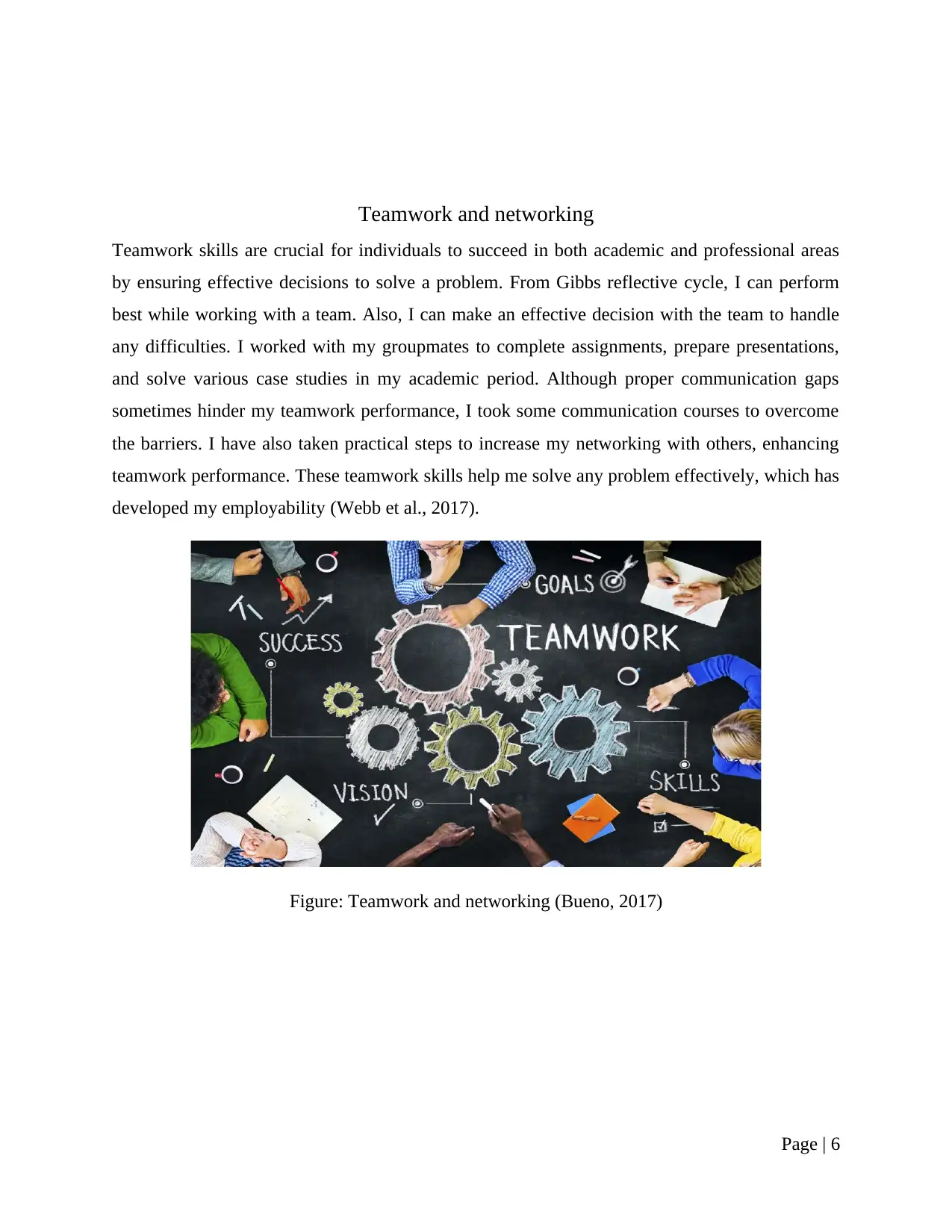
Teamwork and networking
Teamwork skills are crucial for individuals to succeed in both academic and professional areas
by ensuring effective decisions to solve a problem. From Gibbs reflective cycle, I can perform
best while working with a team. Also, I can make an effective decision with the team to handle
any difficulties. I worked with my groupmates to complete assignments, prepare presentations,
and solve various case studies in my academic period. Although proper communication gaps
sometimes hinder my teamwork performance, I took some communication courses to overcome
the barriers. I have also taken practical steps to increase my networking with others, enhancing
teamwork performance. These teamwork skills help me solve any problem effectively, which has
developed my employability (Webb et al., 2017).
Figure: Teamwork and networking (Bueno, 2017)
Page | 6
Teamwork skills are crucial for individuals to succeed in both academic and professional areas
by ensuring effective decisions to solve a problem. From Gibbs reflective cycle, I can perform
best while working with a team. Also, I can make an effective decision with the team to handle
any difficulties. I worked with my groupmates to complete assignments, prepare presentations,
and solve various case studies in my academic period. Although proper communication gaps
sometimes hinder my teamwork performance, I took some communication courses to overcome
the barriers. I have also taken practical steps to increase my networking with others, enhancing
teamwork performance. These teamwork skills help me solve any problem effectively, which has
developed my employability (Webb et al., 2017).
Figure: Teamwork and networking (Bueno, 2017)
Page | 6
Paraphrase This Document
Need a fresh take? Get an instant paraphrase of this document with our AI Paraphraser
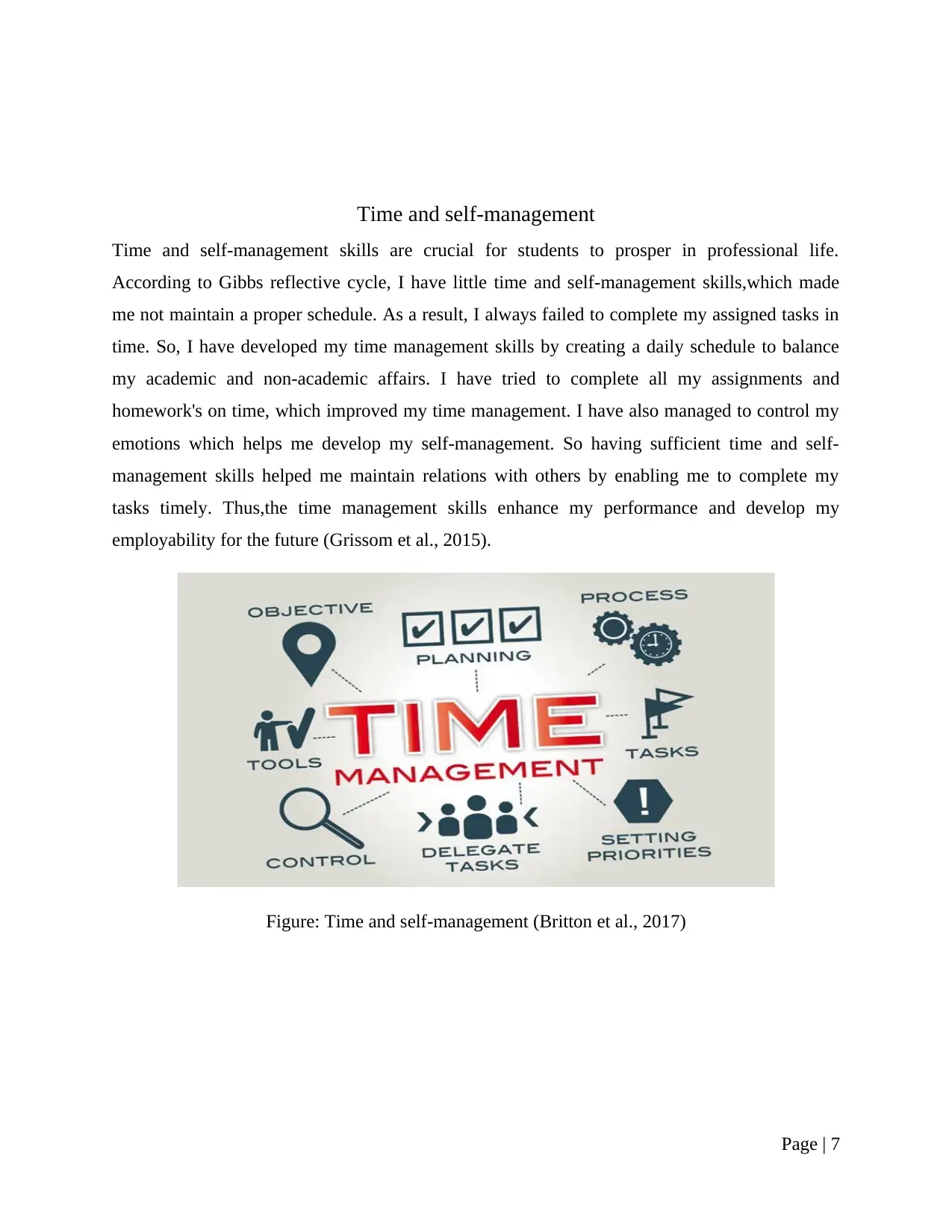
Time and self-management
Time and self-management skills are crucial for students to prosper in professional life.
According to Gibbs reflective cycle, I have little time and self-management skills,which made
me not maintain a proper schedule. As a result, I always failed to complete my assigned tasks in
time. So, I have developed my time management skills by creating a daily schedule to balance
my academic and non-academic affairs. I have tried to complete all my assignments and
homework's on time, which improved my time management. I have also managed to control my
emotions which helps me develop my self-management. So having sufficient time and self-
management skills helped me maintain relations with others by enabling me to complete my
tasks timely. Thus,the time management skills enhance my performance and develop my
employability for the future (Grissom et al., 2015).
Figure: Time and self-management (Britton et al., 2017)
Page | 7
Time and self-management skills are crucial for students to prosper in professional life.
According to Gibbs reflective cycle, I have little time and self-management skills,which made
me not maintain a proper schedule. As a result, I always failed to complete my assigned tasks in
time. So, I have developed my time management skills by creating a daily schedule to balance
my academic and non-academic affairs. I have tried to complete all my assignments and
homework's on time, which improved my time management. I have also managed to control my
emotions which helps me develop my self-management. So having sufficient time and self-
management skills helped me maintain relations with others by enabling me to complete my
tasks timely. Thus,the time management skills enhance my performance and develop my
employability for the future (Grissom et al., 2015).
Figure: Time and self-management (Britton et al., 2017)
Page | 7
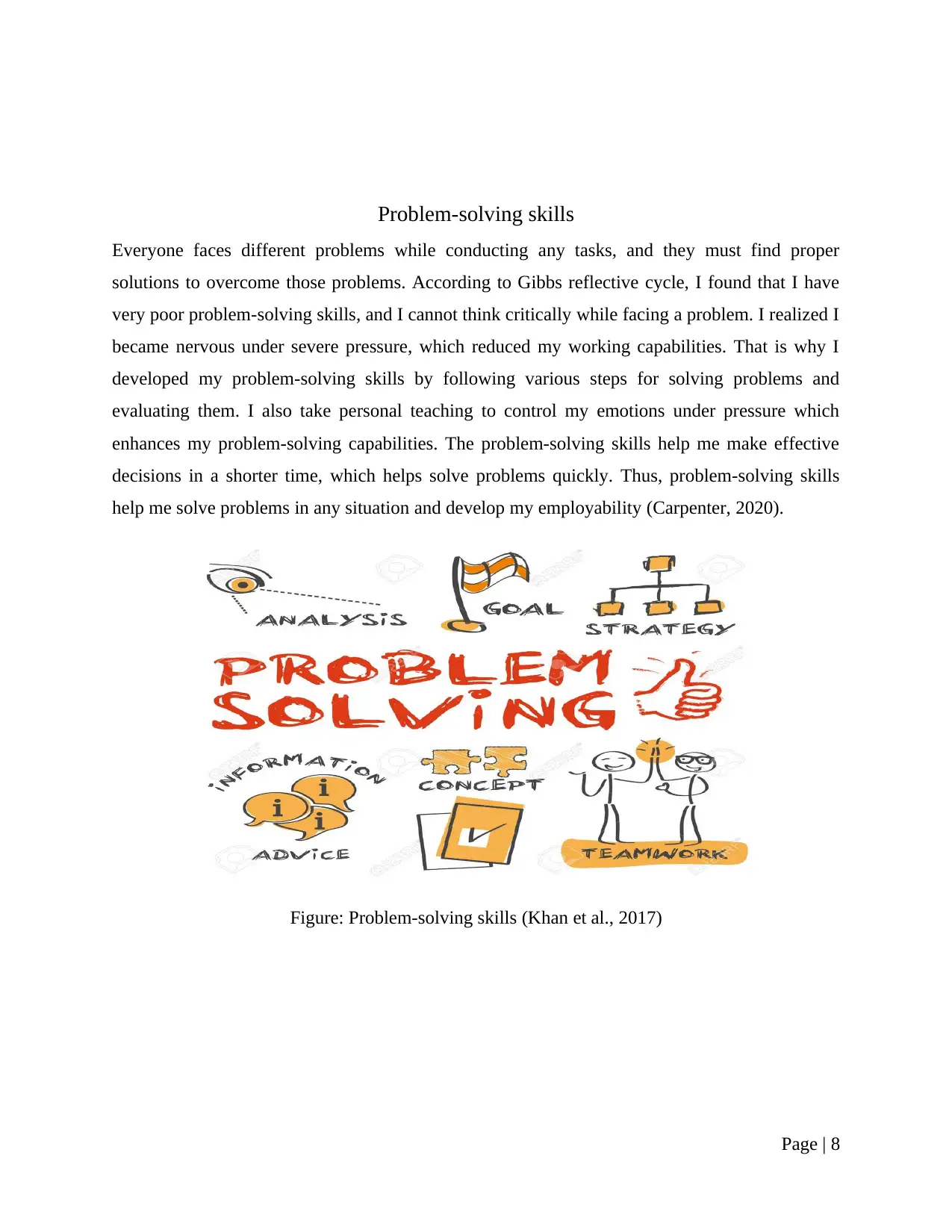
Problem-solving skills
Everyone faces different problems while conducting any tasks, and they must find proper
solutions to overcome those problems. According to Gibbs reflective cycle, I found that I have
very poor problem-solving skills, and I cannot think critically while facing a problem. I realized I
became nervous under severe pressure, which reduced my working capabilities. That is why I
developed my problem-solving skills by following various steps for solving problems and
evaluating them. I also take personal teaching to control my emotions under pressure which
enhances my problem-solving capabilities. The problem-solving skills help me make effective
decisions in a shorter time, which helps solve problems quickly. Thus, problem-solving skills
help me solve problems in any situation and develop my employability (Carpenter, 2020).
Figure: Problem-solving skills (Khan et al., 2017)
Page | 8
Everyone faces different problems while conducting any tasks, and they must find proper
solutions to overcome those problems. According to Gibbs reflective cycle, I found that I have
very poor problem-solving skills, and I cannot think critically while facing a problem. I realized I
became nervous under severe pressure, which reduced my working capabilities. That is why I
developed my problem-solving skills by following various steps for solving problems and
evaluating them. I also take personal teaching to control my emotions under pressure which
enhances my problem-solving capabilities. The problem-solving skills help me make effective
decisions in a shorter time, which helps solve problems quickly. Thus, problem-solving skills
help me solve problems in any situation and develop my employability (Carpenter, 2020).
Figure: Problem-solving skills (Khan et al., 2017)
Page | 8
⊘ This is a preview!⊘
Do you want full access?
Subscribe today to unlock all pages.

Trusted by 1+ million students worldwide
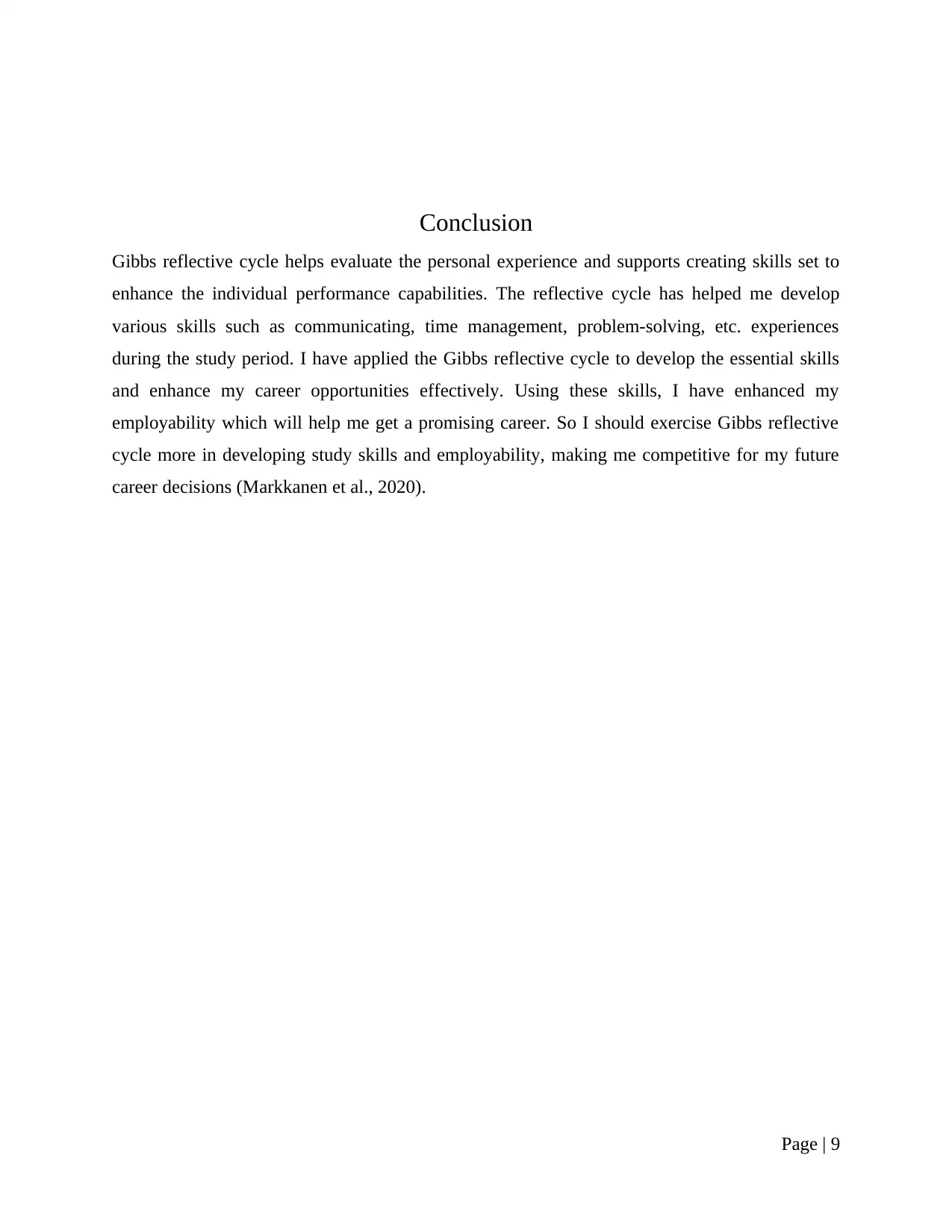
Conclusion
Gibbs reflective cycle helps evaluate the personal experience and supports creating skills set to
enhance the individual performance capabilities. The reflective cycle has helped me develop
various skills such as communicating, time management, problem-solving, etc. experiences
during the study period. I have applied the Gibbs reflective cycle to develop the essential skills
and enhance my career opportunities effectively. Using these skills, I have enhanced my
employability which will help me get a promising career. So I should exercise Gibbs reflective
cycle more in developing study skills and employability, making me competitive for my future
career decisions (Markkanen et al., 2020).
Page | 9
Gibbs reflective cycle helps evaluate the personal experience and supports creating skills set to
enhance the individual performance capabilities. The reflective cycle has helped me develop
various skills such as communicating, time management, problem-solving, etc. experiences
during the study period. I have applied the Gibbs reflective cycle to develop the essential skills
and enhance my career opportunities effectively. Using these skills, I have enhanced my
employability which will help me get a promising career. So I should exercise Gibbs reflective
cycle more in developing study skills and employability, making me competitive for my future
career decisions (Markkanen et al., 2020).
Page | 9
Paraphrase This Document
Need a fresh take? Get an instant paraphrase of this document with our AI Paraphraser
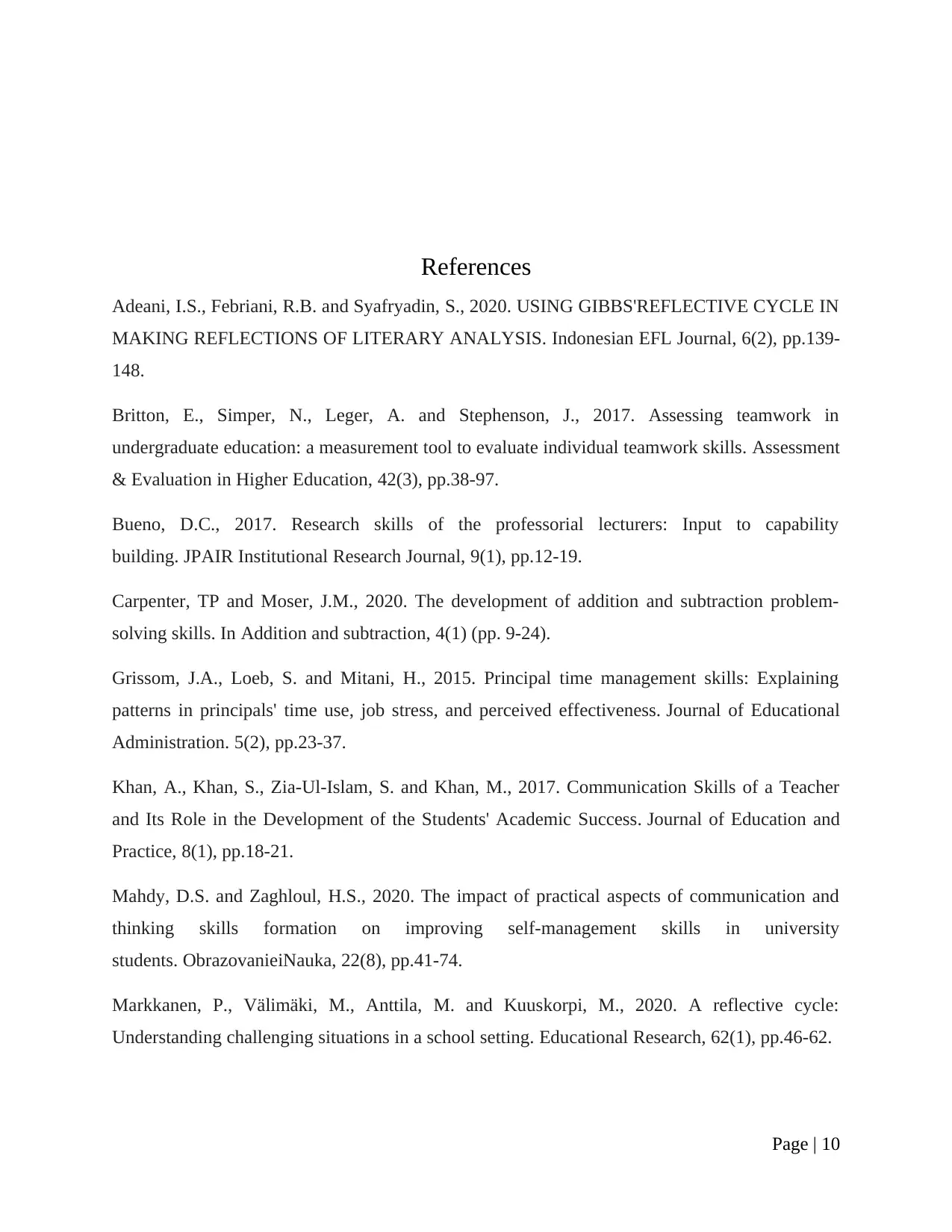
References
Adeani, I.S., Febriani, R.B. and Syafryadin, S., 2020. USING GIBBS'REFLECTIVE CYCLE IN
MAKING REFLECTIONS OF LITERARY ANALYSIS. Indonesian EFL Journal, 6(2), pp.139-
148.
Britton, E., Simper, N., Leger, A. and Stephenson, J., 2017. Assessing teamwork in
undergraduate education: a measurement tool to evaluate individual teamwork skills. Assessment
& Evaluation in Higher Education, 42(3), pp.38-97.
Bueno, D.C., 2017. Research skills of the professorial lecturers: Input to capability
building. JPAIR Institutional Research Journal, 9(1), pp.12-19.
Carpenter, TP and Moser, J.M., 2020. The development of addition and subtraction problem-
solving skills. In Addition and subtraction, 4(1) (pp. 9-24).
Grissom, J.A., Loeb, S. and Mitani, H., 2015. Principal time management skills: Explaining
patterns in principals' time use, job stress, and perceived effectiveness. Journal of Educational
Administration. 5(2), pp.23-37.
Khan, A., Khan, S., Zia-Ul-Islam, S. and Khan, M., 2017. Communication Skills of a Teacher
and Its Role in the Development of the Students' Academic Success. Journal of Education and
Practice, 8(1), pp.18-21.
Mahdy, D.S. and Zaghloul, H.S., 2020. The impact of practical aspects of communication and
thinking skills formation on improving self-management skills in university
students. ObrazovanieiNauka, 22(8), pp.41-74.
Markkanen, P., Välimäki, M., Anttila, M. and Kuuskorpi, M., 2020. A reflective cycle:
Understanding challenging situations in a school setting. Educational Research, 62(1), pp.46-62.
Page | 10
Adeani, I.S., Febriani, R.B. and Syafryadin, S., 2020. USING GIBBS'REFLECTIVE CYCLE IN
MAKING REFLECTIONS OF LITERARY ANALYSIS. Indonesian EFL Journal, 6(2), pp.139-
148.
Britton, E., Simper, N., Leger, A. and Stephenson, J., 2017. Assessing teamwork in
undergraduate education: a measurement tool to evaluate individual teamwork skills. Assessment
& Evaluation in Higher Education, 42(3), pp.38-97.
Bueno, D.C., 2017. Research skills of the professorial lecturers: Input to capability
building. JPAIR Institutional Research Journal, 9(1), pp.12-19.
Carpenter, TP and Moser, J.M., 2020. The development of addition and subtraction problem-
solving skills. In Addition and subtraction, 4(1) (pp. 9-24).
Grissom, J.A., Loeb, S. and Mitani, H., 2015. Principal time management skills: Explaining
patterns in principals' time use, job stress, and perceived effectiveness. Journal of Educational
Administration. 5(2), pp.23-37.
Khan, A., Khan, S., Zia-Ul-Islam, S. and Khan, M., 2017. Communication Skills of a Teacher
and Its Role in the Development of the Students' Academic Success. Journal of Education and
Practice, 8(1), pp.18-21.
Mahdy, D.S. and Zaghloul, H.S., 2020. The impact of practical aspects of communication and
thinking skills formation on improving self-management skills in university
students. ObrazovanieiNauka, 22(8), pp.41-74.
Markkanen, P., Välimäki, M., Anttila, M. and Kuuskorpi, M., 2020. A reflective cycle:
Understanding challenging situations in a school setting. Educational Research, 62(1), pp.46-62.
Page | 10
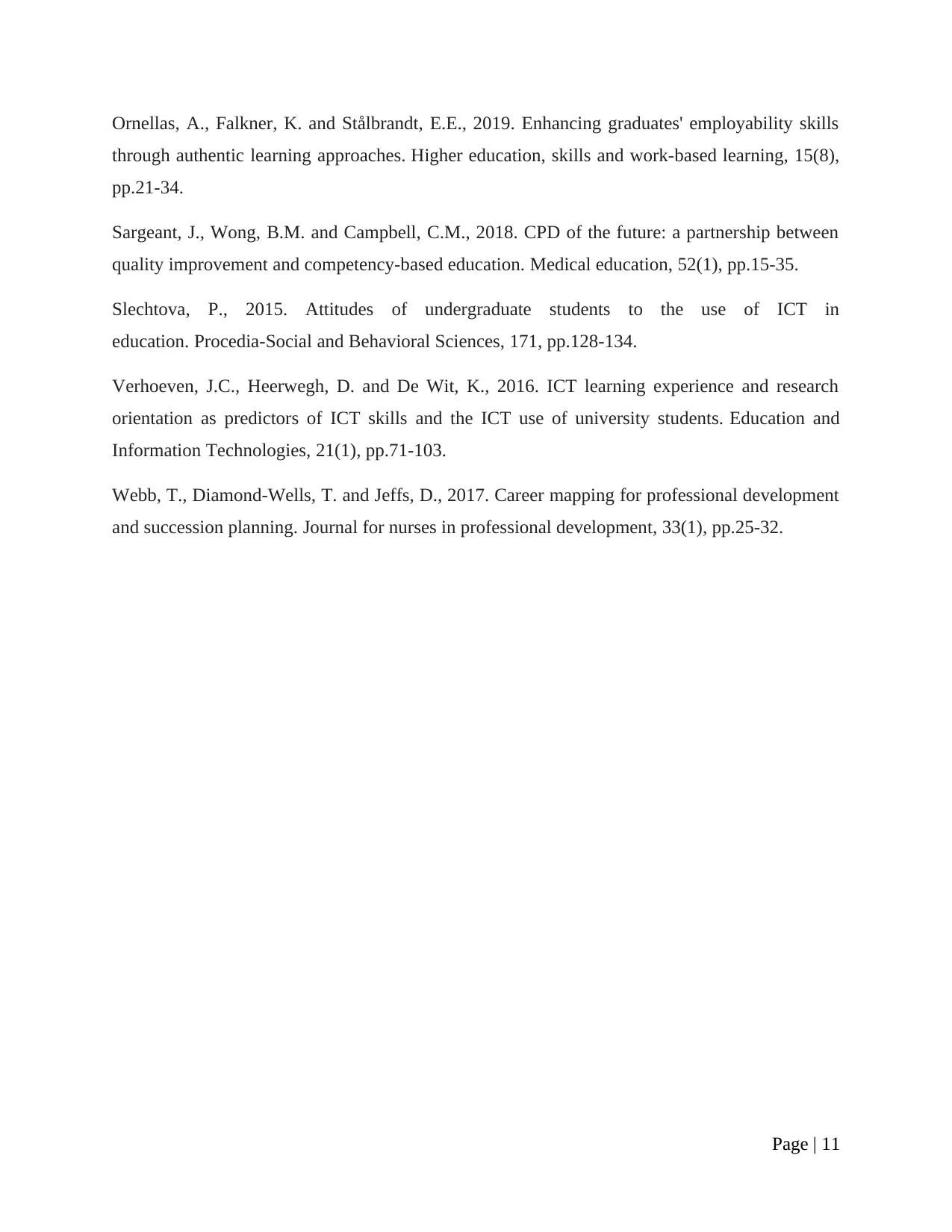
Ornellas, A., Falkner, K. and Stålbrandt, E.E., 2019. Enhancing graduates' employability skills
through authentic learning approaches. Higher education, skills and work-based learning, 15(8),
pp.21-34.
Sargeant, J., Wong, B.M. and Campbell, C.M., 2018. CPD of the future: a partnership between
quality improvement and competency‐based education. Medical education, 52(1), pp.15-35.
Slechtova, P., 2015. Attitudes of undergraduate students to the use of ICT in
education. Procedia-Social and Behavioral Sciences, 171, pp.128-134.
Verhoeven, J.C., Heerwegh, D. and De Wit, K., 2016. ICT learning experience and research
orientation as predictors of ICT skills and the ICT use of university students. Education and
Information Technologies, 21(1), pp.71-103.
Webb, T., Diamond-Wells, T. and Jeffs, D., 2017. Career mapping for professional development
and succession planning. Journal for nurses in professional development, 33(1), pp.25-32.
Page | 11
through authentic learning approaches. Higher education, skills and work-based learning, 15(8),
pp.21-34.
Sargeant, J., Wong, B.M. and Campbell, C.M., 2018. CPD of the future: a partnership between
quality improvement and competency‐based education. Medical education, 52(1), pp.15-35.
Slechtova, P., 2015. Attitudes of undergraduate students to the use of ICT in
education. Procedia-Social and Behavioral Sciences, 171, pp.128-134.
Verhoeven, J.C., Heerwegh, D. and De Wit, K., 2016. ICT learning experience and research
orientation as predictors of ICT skills and the ICT use of university students. Education and
Information Technologies, 21(1), pp.71-103.
Webb, T., Diamond-Wells, T. and Jeffs, D., 2017. Career mapping for professional development
and succession planning. Journal for nurses in professional development, 33(1), pp.25-32.
Page | 11
⊘ This is a preview!⊘
Do you want full access?
Subscribe today to unlock all pages.

Trusted by 1+ million students worldwide
1 out of 12
Related Documents
Your All-in-One AI-Powered Toolkit for Academic Success.
+13062052269
info@desklib.com
Available 24*7 on WhatsApp / Email
![[object Object]](/_next/static/media/star-bottom.7253800d.svg)
Unlock your academic potential
Copyright © 2020–2026 A2Z Services. All Rights Reserved. Developed and managed by ZUCOL.




